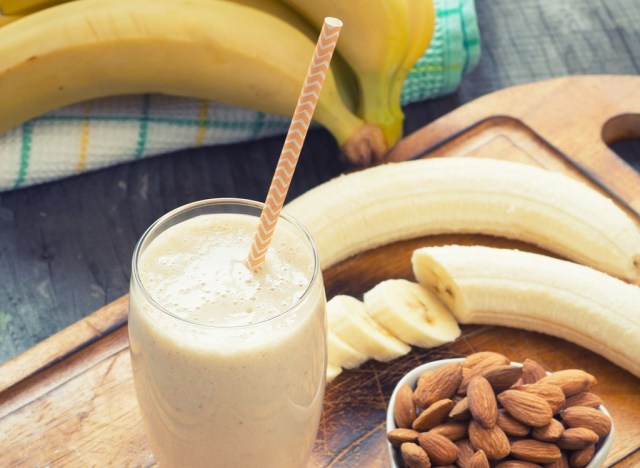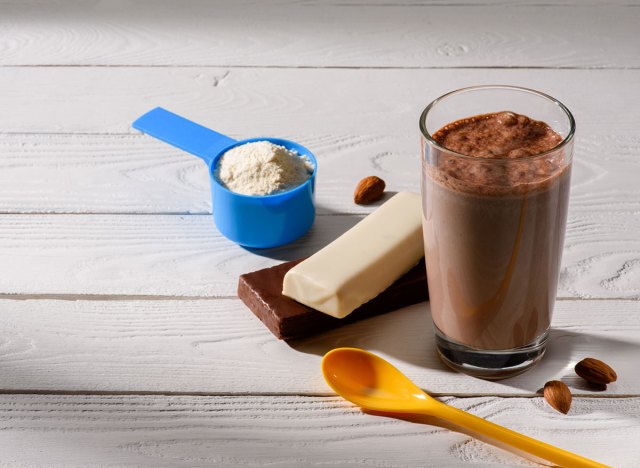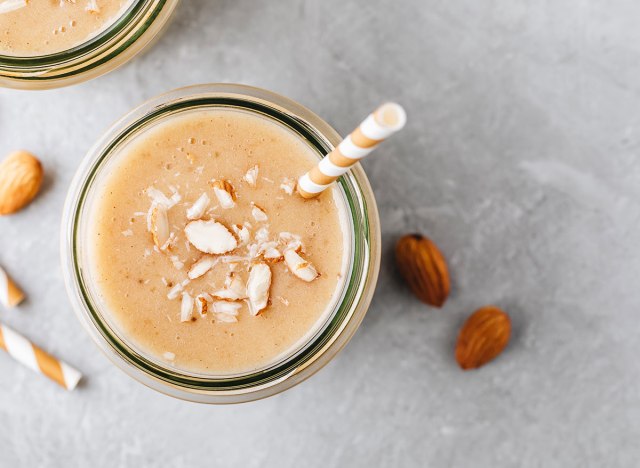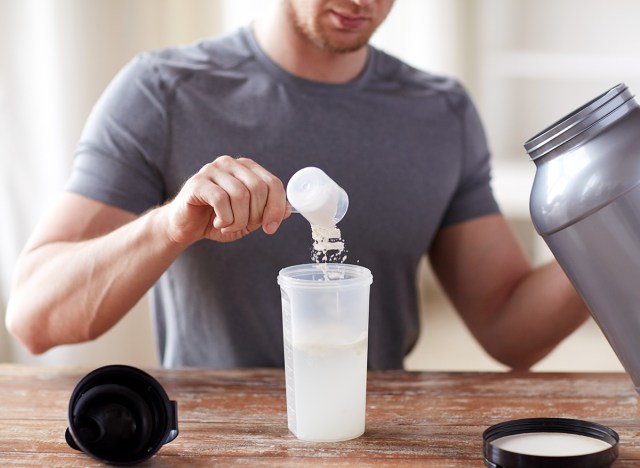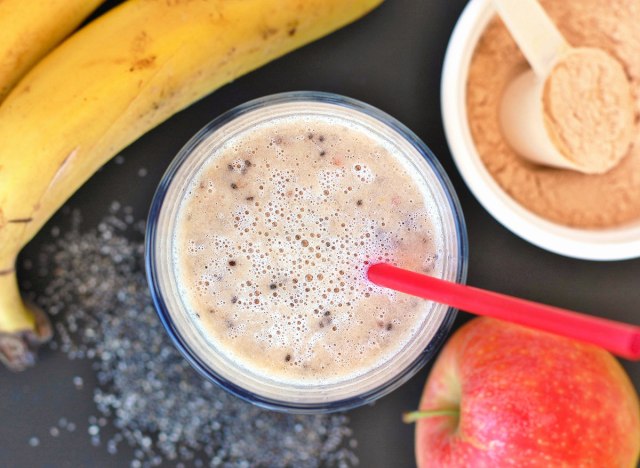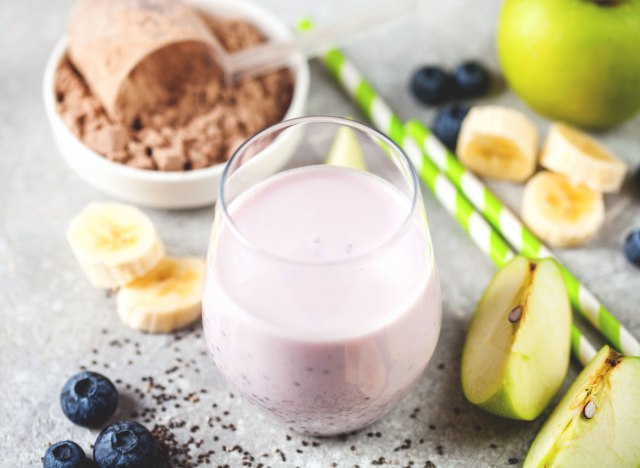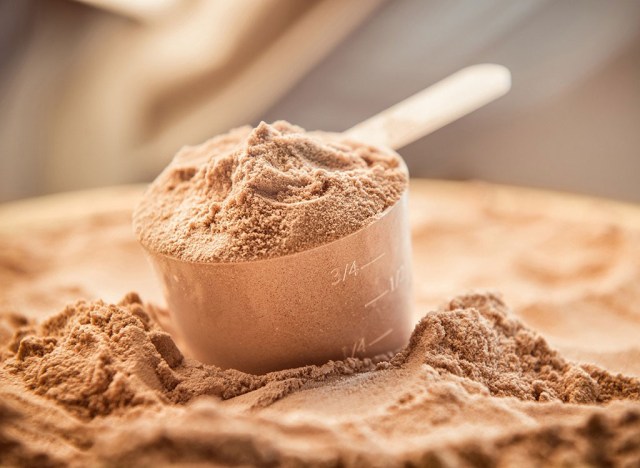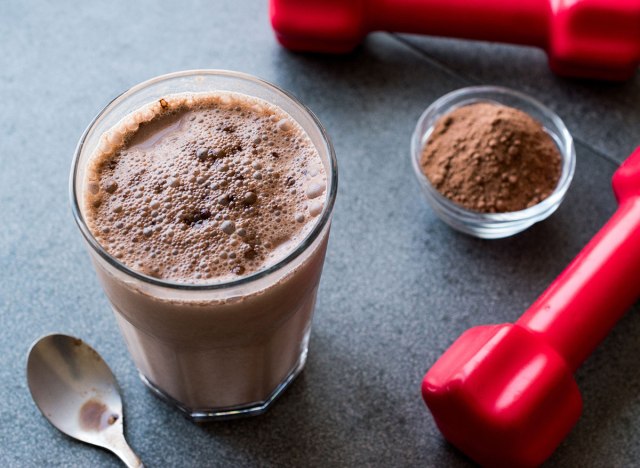Surprising Side Effects of Drinking Protein Shakes, Says Science
Whether you’re following a diet or not, you’re probably hyperaware of the importance of eating more protein, having heard about the macronutrient’s ability to promote weight loss while maintaining muscle mass. Protein satisfies hunger longer than carbs do; it’s the key building block of strong muscles, and who doesn’t want a leaner body?
The makers of protein shakes and powders capitalize on all that to market protein supplements, a product category that shows no signs of softening. Projections suggest the global market for whey protein alone will reach $15.4 billion (U.S.) by 2024, according to Statista.com.
While it is good to eat a sufficient amount of protein, and the demand for protein shakes has increased significantly, there are still a few potential side effects of drinking protein shakes you need to know about. Here’s what to keep in mind, and if you’re looking for even more drinking tips, be sure to read up on our list of the 108 Most Popular Sodas Ranked by How Toxic They Are.
Allergic reactions.
With more and more people using protein supplements, it’s not surprising that doctors are seeing more incidents of food allergies linked to consuming protein shakes. In Archives of Clinical Case Studies, allergy specialists at the University of Nebraska Medical Center report seeing several patients with significant allergic reactions after drinking whey protein shakes, including sneezing, throat swelling, flushed skin, abdominal pain with cramps, explosive diarrhea, chest tightness, and shortness of breath.
The doctors note that while a cow’s milk allergy is less common in adults than in children, it can provoke a severe reaction. They also said that many protein supplements contain soy lecithin, which may have also contributed to the allergic reactions they witnessed in the emergency department. Before eating or drinking a protein product, check the source of the protein; eggs, milk, and soy are common allergens.
Here’s What Happens To Your Body When You Drink Protein Shakes Every Day.
Consuming more calories than you realize.
Liquid calories can be consumed very quickly, and the brain may not recognize them as readily as they do calories from solid foods. So, when you drink protein shakes regularly, you may end up gaining weight.
“Protein shakes can be very high in calories, especially from added sugars,” says Leann Poston, MD, of Invigor Medical. “You may not feel full after drinking a liquid shake and follow it with a full meal.”
One way to prevent swallowing all those extra calories and gaining weight may be to drink a protein shake just before or with a meal rather than as a between-meal snack. One study found that people who drank protein shakes in between meals did not automatically eat less at mealtimes.
RELATED: Get even more healthy tips straight to your inbox by signing up for our newsletter!
Kidney stones
Diets that are very heavy on proteins and low in carbohydrates raise urine calcium and can increase the risk of developing kidney stones and cause liver damage, according to a study in International Scholarly Research Notices. High protein increases the production of oxalate crystals, which stick to calcium in urine forming a solid mass that can get painfully stuck in the ureter.
“Check with your doctor if you have kidney disease to ensure added protein is safe for your kidneys and what your limits should be,” says Dr. Poston.
Stronger bones
One unexpected positive side effect of protein intake may be a lower risk of hip fractures as you get older. A Harvard study published in Osteoporosis International analyzed data from more than 100,000 people over the course of 30 years, looking specifically at diet and bone fracture rates. The researchers found that the risk of fracture went down in the men as protein consumption from all sources went up. While protein intake from all sources didn’t increase or reduce fractures in women, those women who had higher intakes of plant-based and dairy proteins versus meat proteins had a lower risk of hip fractures.
A mucked-up microbiome
Many people use protein shakes as meal replacements. While low-calorie, high-satiety protein drinks can be useful for reducing calories, they can force you to unwittingly avoid important nutrients that you might otherwise get from the foods being replaced, like vitamins, minerals, and fiber, says nutritionist Trista Best, RD, at Balance One Supplements.
“Many protein powders lack fiber, which can cause a gut microbiota imbalance, and affect your immune system,” she says.
Extra calorie burn
“There’s a lot of really solid evidence that protein has a higher thermogenic effect than its counterpart macronutrients, fats, and carbohydrates,” says certified sports nutritionist Jake Harcoff, CSCS, owner of AIM Athletic in British Columbia.
This means your body will burn more calories metabolizing that protein through digestion.
“I suggest to all my fat-loss clients to include a protein shake in their daily diet, not only to aid them in increased calorie burn but also to spare muscle when they are losing fat,” says Harcoff.
Better hunger management
Eating protein increases satiety to a greater extent than carbohydrate or fat and may result in reduced calorie intake, according to a study in The American Journal of Clinical Nutrition.
“That means if someone is on a calorie-restricted diet and is experiencing hunger pangs, a protein shake might be a good option to satisfy their cravings,” says Harcoff. “Also, a lot of hunger is really the result of dehydration, which drinking a protein shake can fix.”
When you’re ready to fire up your blender again, try these 13 Best Protein Shake Recipes for Weight Loss.
Increased heart attack risk
A recent animal study published in the journal Nature Metabolism showed that high protein diets may directly affect cardiovascular health, potentially increasing the risk of a heart attack.
Researchers evaluated two groups of mice—one fed a high fat, high protein diet (46% of calories from protein), and the other a high fat, low protein (15% of calories from protein) diet. It turned out that the mice on the high fat, high protein diet developed significantly worse arterial plaque than the mice on the high fat, low protein diet.
What’s more, the plaque in the rodents’ arteries was of the unstable variety that tends to break apart and increase heart attack risk.
“Our study shows how and why dietary protein leads to the development of unstable plaques,” says Dr. Babak Razani, an associate professor of medicine from Washington University School of Medicine in St. Louis, MO told Medical News Today. “A couple of scoops of protein powder in a milkshake or a smoothie adds something like 40 grams of protein—almost equivalent to the daily recommended intake.”
Ingesting heavy metals and toxins
Like all dietary supplements, protein powders aren’t regulated by the Food and Drug Administration, which means you have to rely on the goodwill of manufacturers to ensure that they are safe to consume.
In 2018, a study sponsored by the Clean Label Project, a national nonprofit focused on transparency in labeling, released a study showing that many of the top-selling protein powder supplements contain heavy metals and BPA (bisphenol A), an industrial chemical used in plastics and a known endocrine disruptor. The worst offenders were plant-based protein powders, which were found to contain lead, mercury, cadmium, and arsenic. The study also found that 28 out of 134 of the protein powders contained twice the regulatory limit (3 micrograms) of BPA while other protein powders tested free of BPA.
Here’s The Surprising Truth About Protein Powders You Need To Know.
The post Surprising Side Effects of Drinking Protein Shakes, Says Science appeared first on .

